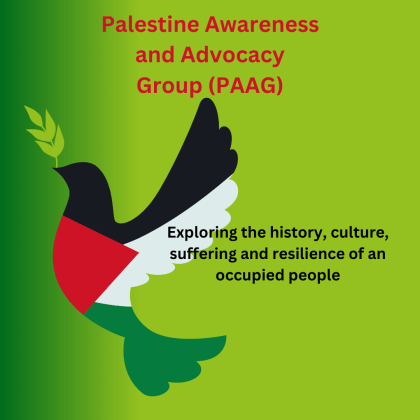Palestine Awareness and Advocacy Group

The Palestine Awareness and Advocacy Group (PAAG) seeks to deepen understanding of the history and culture of the Palestinian people, and the conditions under which they exist, through speakers, films, and cultural sharing. By design its programs will center Palestinian perspectives and voices because Palestinian history is rarely taught, Palestinian stories are rarely told, and Palestinian voices, and cries, are often silenced or dismissed. Please join us. Our activities will be grounded in a commitment to human rights, justice, and freedom from violence for all.
Our tagline is Palestine Awareness and Advocacy Group: Exploring the history, culture, suffering, and resilience of an occupied people
Please join the First UU Palestine Awareness and Advocacy Group on April 28th 12:30pm for a light lunch and a presentation by guest speaker Dr Faedah Totah, PhD. There will be time for Q&A with Dr Totah. Following Dr. Totah’s presentation, there will be a facilitated Dialogue on the issues. Everyone is welcome to come and be heard.
Faedah M. Totah is an associate professor in the School of World Studies at Virginia Commonwealth University in Richmond, VA. She is a trained anthropologist with a research interest in urban issues and place-making. She has worked extensively on the cultural, social, and economic impact of gentrification on the Old City of Damascus. The results of this research were the subject of the book Preserving the Old City of Damascus published in 2014 by Syracuse University Press. She has also authored several articles dealing with Syria and the Middle East. Her current research focus is on migration and refugees in Syria. She is currently preparing a manuscript for publication that examines the experiences of Palestinian urban refugees in the Jewish Quarter of the Old City of Damascus.
Palestine: The Untold Story
Palestinian history, stories, and memories have been attacked and deliberately erased for the past 100 years.
This historical presentation will begin with the Balfour Declaration that refused to acknowledge the indigenous people in Palestine and how this refusal to see or hear Palestinians has continued to this day. We will focus on the history of Palestine using maps and historical events and decisions made by neighboring countries and world powers. We will end in discussing the continued attempts to herd Palestinians into refugee camps either in Egypt and/or parts of Gaza.
